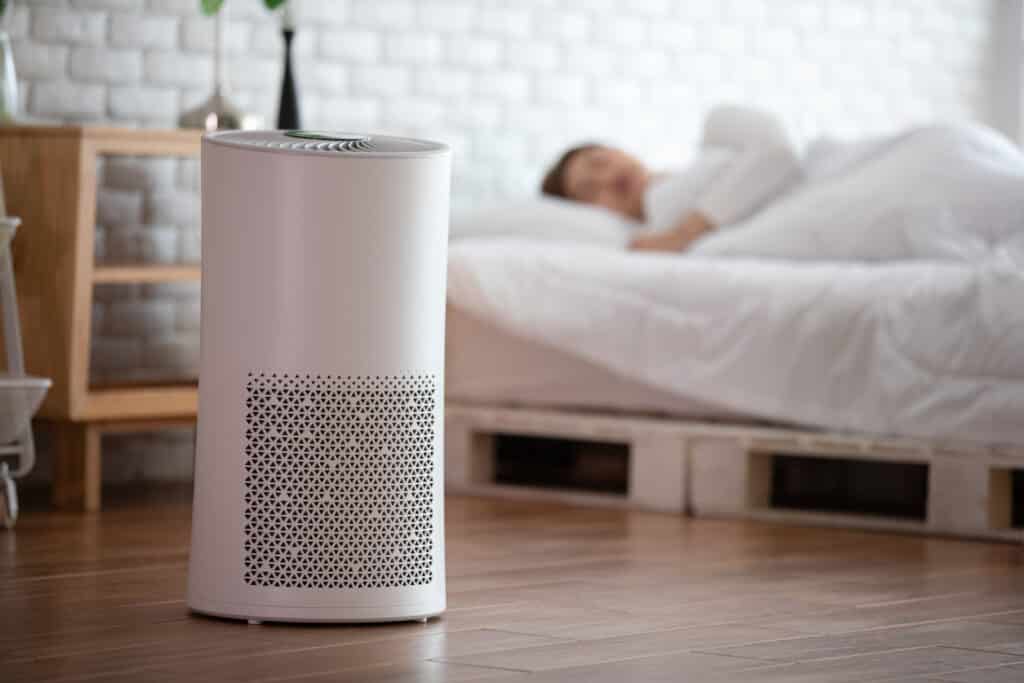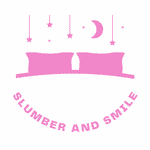We all know that our sleep is important, but it can be hard to get a good night’s rest. The best way to improve your sleep quality is to have a clean and fresh air environment. There are many ways you can do this, including with an air purifier – wo should you use one at night?
Air purifiers work by removing pollutants from the air. This can be helpful for people with allergies or asthma, or who live in heavily polluted areas. But even if you don’t have respiratory problems, an air purifier can improve the quality of the air – and therefore your – breathing.
However, some people find that the noise of an air purifier disturbs their sleep at night, meaning that it’s not a good option for them to use to sleep with.
Some air purifiers even produce ozone – which can be detrimental to your health in the long term. Read on for more information on the pros and cons of sleeping with an air purifier on.

How do air purifiers work?
An air purifier is a device that works to purify the indoor air in your home. Air can carry countless contaminants, pollutants and allergens, and these can cause health problems for you and your loved ones. Many people use an air purifier so they don’t have to deal with any of those issues. An air purifier does not just filter the air in one room. It can circulate air in a building or entire house to ensure that all indoor air is purified.
How do these purifiers work? There are two types of purifiers, including mechanical filters and electronic devices. Mechanical devices use different filtration methods to remove contaminants from the air, while electronic units use ultraviolet light or plasma oxidation to break down pollutants.
Many air purifiers have a fan that sucks in the air in the room, and then filters which capture pollutants and particles in the air in order to improve the indoor air quality. The filters are normally made up of either fiber or mesh.
Some air purifiers then have ultraviolet light to destroy molecules from mold and bacteria. You can also find activated charcoal filter air purifiers which can even remove gases and smoke particles from the air.
The more high-tech the air purifier, the more it is likely to improve the air quality of your room and leave you with perfectly clean air.
Can you sleep with an air purifier on?
If you purchase a good quality air purifier then you should be able to sleep with it on so long as you feel that it enhances your sleep quality rather than disturbs it.
Good quality air purifiers do not give off harmful ozone. However, they may still make a noise which causes restlessness for some people, who prefer total silence when it comes to bedtime.
Alternatively, you may decide to sleep with a fan and a humidifier on to get the benefit of moist air circulating through your bedroom.
Is it safe to sleep with an air purifier on?
Many people enjoy sleeping with an air purifier on at night, and there is no doubt that it will improve the quality of your sleep. However, this doesn’t mean that you should ignore any safety concerns.
Ozone has been found to cause health problems in some cases when inhaled over a long period, such as during sleep. However, it can be broken down very quickly in the air, and then there is a minimal risk that you will inhale levels of ozone that are dangerous.
The other safety concern when it comes to sleeping with an air purifier on is the noise. As we mentioned earlier, some people find that air purifiers make too much noise for them to sleep comfortably.
If you are someone who is concerned about the safety of sleeping with an air purifier on, then it’s best to consult the manufacturer to see if your model produces ozone and how much noise it makes. You can also try out the purifier in a store before you buy it to see if it’s right for you.
Are air purifiers meant to run at night?
You can run an air purifier at any time of day, but you will typically see more benefits if you run it for longer periods during the night.
The reason why is that the purifier will circulate air throughout your home, which means that all your family members can benefit from cleaner air. It’s also likely to keep pollutant levels lower throughout the night.
What is the best air purifier for sleeping?
If you plan on running your purifier through the night, then it’s important that you choose an air purifier that does not produce ozone or make excessive noise. It’s also vital to check reviews from previous customers to ensure that they had a positive experience with the device.
Benefits of sleeping with air purifier
Lots of people claim that air purifiers improve sleep by helping with allergies and asthma.
Fight allergies
In fact, many people spend thousands of dollars on specialist masks that can be worn when they sleep at night to help with breathing issues.
However, if you have an air purifier then you could simply run it through the night in a room where you sleep to get rid of dust, pollen and other triggers which can cause breathing problems.
Eliminate smells
Not only can air purifiers help with allergies and asthma, but they can also help to get rid of smells in the room. Whether you have pets or you just cook a lot of food, there is likely to be a smell in your room that an air purifier can help to remove.
Reduce eczema
Air purifiers are also great for people who suffer from eczema. The high-quality filters in an air purifier can help to remove the dust and dirt particles from the room which can aggravate eczema symptoms.
Reduce the risk of sleep apnea
People who suffer with sleep apnea often experience very poor sleep, which can actually be improved by high air quality produced by air purifiers. This is because it is now believed that air polution can induce sleep apnea. Reducing air polution and increasing home air quality can therefore reduce the risk of sleep apnea.
If you’re looking for a way to improve your sleep quality, then it’s definitely worth considering buying an air purifier.
Can an air purifier help protect against Covid-19?
An air purifier which uses a HEPA filter (High Efficiency Particulate Air filter) will filter out water droplets and other particles in the air which may be carrying Covid-19. This means that an air purifier might be able to aid in the fight against Covid-19.
The problem is that an air filter takes time to filter all the air in a room – by which time the virus may already have made its way to a person and infected them.
Can air purifiers help you sleep better?
It’s a question many people ask themselves.
Since your bedroom is where you spend about a third of your life, it’s important to having a clean and comfortable environment. A purifier can help filter out dust, allergens, bacteria and other particles that may disrupt your sleep.
You can also get a better night’s sleep from being able to breathe easier due to having clean, fresh air in the room rather than sleeping surrounded by indoor pollutants.
Removing dust mites, mold spores and other airborne particles such as pet hair from the room you sleep on will definitely help you to rest easier and can help you overcome several sleep issues such as allergies, stuffy nose, sinus headaches and sleep apnea.
What type of air purifier should I use to sleep with?
If you’re considering purchasing an air purifier for your bedroom, there are a few things to keep in mind. First, consider the size of the room. Air purifiers come in a variety of sizes, so make sure you get one that’s appropriate for the size of your bedroom.
Also, think about the type of filter you want. The most common type of filter is a mechanical filter, which removes particles from the air by trapping them in a mesh. Another type of filter is an electronic filter, which uses a electric current to kill bacteria and viruses.
Finally, decide what kind of noise the purifier makes. Some purifiers are very quiet, while others are louder. If you’re a light sleeper, you may want to choose a quieter model.
Once you’ve chosen an air purifier, it’s important to use it properly. Follow the manufacturer’s instructions for how often to change the filter and how to clean the unit.
Air purifiers can help you sleep better, but it’s important to choose the right one and use it properly. By following these tips, you can get the most out of your air purifier and improve your sleep quality.
Cons of sleeping with an air purifier on
The biggest problem you might experience with sleeping with an air purifier on is the noise that they can generate, which may make it difficult to fall asleep or get quality sleep at night.
If you are going to use an air purifier all night, consider getting one which has a low volume output, or invest in a white noise machine to block out the noise.
Air purifiers also use quite a bit of electricity, so you may find that you electricity bill increases if you are going to run your purifier for many hours every day. You may decide that good sleep is worth the cost of electricity!
Instead, you may decide simply to sleep with the window open.
Conclusion: Should I sleep with an air purifier on?
There is no definite answer as to whether or not you should sleep with an air purifier on. Ultimately, it depends on what type of air purifier you have, how large the room is, and how sensitive your ears are to noise.
If you decide to sleep with an air purifier on, make sure you choose a model that is quiet and that you are comfortable with the noise level. Also, be sure to follow the manufacturer’s instructions for use and cleaning.
Air purifiers can help you sleep better, but it’s important to make sure you use the right one for your needs and your budget. With a little research, you’re sure to find the perfect air purifier for your bedroom!
